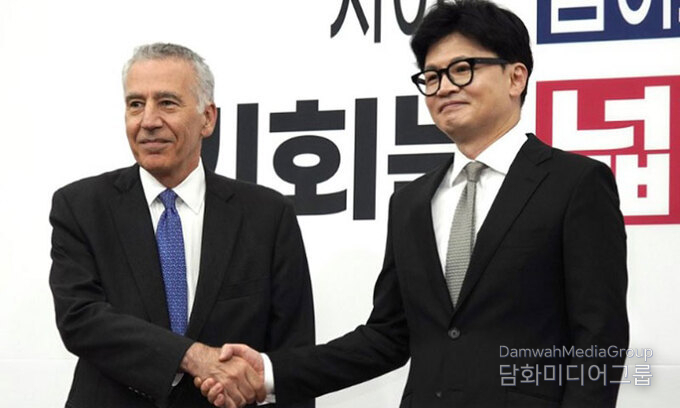By Diplomacy Journal Lee Kap-soo
U.S. Ambassador to the Republic of Korea Philip Goldberg, who met with Han Dong-hoon, the leader of the ruling People Power Party, said that he was convinced that the two countries are strongly connected by shared values and principles.”
After meeting with Han at the National Assembly on Sept. 20, Amb. Goldberg posted a photo of the two men shaking hands on social media. “It was a pleasure to meet with Mr. Han,” Goldberg wrote in Korean, ”and our discussions reaffirmed that the United States and South Korea are firmly connected by our shared values and our mutual commitment to promote and defend those principles.”

Amb. Goldberg and Mr. Han are old friends. The two met in January 2023 at the Government Complex in Gwacheon, South Korea, when Mr. Han was serving as the first Minister of Justice under the Yoon Suk-yeol administration.
At that time, Minister Han and Amb. Goldberg agreed to strengthen cooperation in a variety of areas, including joint response to corruption crimes. This will be Han's first face-to-face meeting since becoming the leader of the ruling People Power Party in July.
“I know that the salute of the US 2nd Infantry Division stationed in South Korea is 'Second to None,' which means also 'second to none' in Korean, and I think this phrase refers to the strong alliance between South Korea and the United States,” Han reportedly told Goldberg, noting that the alliance between the two countries, which was founded in 1953, is celebrating its 71st anniversary this year.
Han traveled to the United States for training in August 2004, more than three years after becoming a prosecutor, and stayed there for about a year and a half until February 2006.
During that time, he attended Columbia University Law School, earning his LL.M. in May 2005, and was admitted to the New York State Bar in November of the same year. Upon returning to the prosecutor's office, he was assigned to the Central Investigations Unit (now the Anti-Corruption Unit) as an assistant prosecutorial researcher, where he worked on high-profile cases, including crimes involving large corporations.







